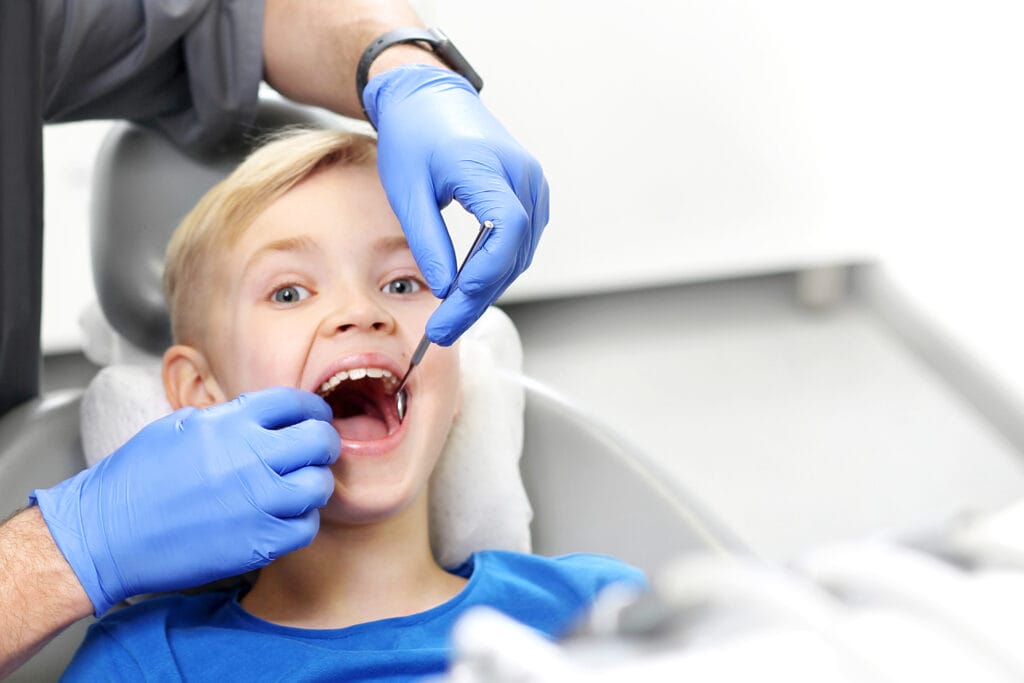Taking care of a child’s oral health is very important from the time they are babies through their teenage years. In the United States, many children have tooth decay, which can lead to pain, infections, and sometimes tooth loss. This guide gives parents the information they need to keep their child’s oral health in good shape through every age, starting from infancy.
Establishing Good Oral Hygiene Early On
A child’s journey to healthy smiles starts early with good oral care habits. Parents can begin dental care in infancy to promote strong teeth and gums. Encourage daily brushing and flossing, starting by wiping the baby’s gums after feedings and transitioning to a soft toothbrush with fluoride toothpaste once the first tooth appears.
The Best Age to Start Oral Hygiene Practices
Starting oral hygiene early is crucial. The American Dental Association recommends taking your child to the dentist by their first birthday or within six months of their first tooth appearing. Supervise brushing with fluoride toothpaste and introduce flossing at age two to three to instill lifelong oral hygiene habits.
Essential Dental Care Tips for Infants and Toddlers
Proper dental care is crucial for infants and toddlers to prevent gum disease and maintain oral health. Follow these tips:
- Wipe your baby’s gums with a damp cloth to remove milk sugars after feedings.
- Use a soft-bristled infant toothbrush when the first tooth appears.
- Avoid letting them sleep with a bottle; encourage cup drinking around age one.
These habits promote good oral health, benefiting their overall well-being.
Regular Dental Checkups: A Pillar of Child’s Oral Health
Regular dental checkups are a must. They help detect issues like tooth decay and gum disease early. Schedule appointments every six months or as the dentist recommends for cleanings, fluoride treatments, and advice to ensure optimal oral health.
Choosing the Right Pediatric Dentist in Gahanna, Ohio
When choosing a pediatric dentist, consider their experience and the office environment. Opt for a team that specializes in children’s care and strives to create a fun and comfortable atmosphere. Pediatric dentists are trained to address young patients’ needs and alleviate their concerns through welcoming offices with bright colors, toys, and friendly staff. Prioritizing your child’s comfort during dental visits ensures their oral health remains optimal in the long run.
Preparing Your Child for Their First Dental Visit
A child’s first dental visit should be happy. Prepare them by reading books, watching videos, and role-playing as a dentist. Explain that a friendly hygienist will clean their teeth, and the dentist will check their smile.
Make it fun and stress the importance of dental visits for healthy teeth and a nice smile. These tips ensure a positive first visit, promoting good oral health in the long run.
Combatting Common Dental Issues in Children
Early action and good habits are vital in preventing dental issues at any age. Common problems in kids include cavities, misaligned teeth, and gum disease. By following this guide, you can help your child maintain good oral health and prevent future dental issues. Parents play a crucial role in instilling healthy oral habits from a young age.
Preventing Cavities: Do’s and Don’ts for Parents
Cavities are common in children but can be prevented with good oral care and healthy eating habits. Here’s what parents should and shouldn’t do:
Do:
- Use fluoride toothpaste to strengthen enamel.
- Limit sugary snacks and drinks to prevent acid buildup.
- Encourage regular brushing and flossing to maintain dental health.
Don’t:
- Allow your child to sip sugary drinks all day.
- Alow them to sleep with a bottle of milk, formula, or juice.
- Use sugary treats as rewards.
Following these tips can reduce cavities and promote a healthy smile.
Dealing with Misaligned Teeth: When to Consider Braces
Misaligned teeth in children can affect appearance, bite, speech, and oral health. Some issues may resolve with growth, while others need orthodontic treatment. Braces during adolescence improve both the aesthetics and functionality of teeth. Early consultation with an orthodontist ensures the best treatment plan for your child, boosting self-esteem and promoting proper dental growth for a confident smile.
Nutrition’s Role in Oral Health
Good nutrition is crucial for strong teeth and healthy gums. A balanced diet of fruits, vegetables, dairy, and lean meats provides essential vitamins and minerals for optimal oral health. Teaching kids good eating habits early ensures lifelong dental health.
Foods That Strengthen Your Child’s Teeth and Gums
Incorporating teeth and gums-friendly foods into your child’s diet is simple and delicious. Focus on calcium, phosphorus, and vitamin D-rich foods for strong teeth and healthy gums.
Include:
- Dairy products like milk, cheese, and yogurt for calcium.
- Fatty fish and egg yolks for vitamin D.
- Lean meats, poultry, fish, beans, and nuts for phosphorus.
A balanced diet with these foods will promote good oral health by strengthening teeth and gums.
Harmful Foods and Beverages to Avoid
It is essential to limit your child’s intake of certain foods and drinks that can hurt their teeth. Many of these contain a lot of sugar, which can cause tooth decay and weaken tooth enamel.
Here are some foods and drinks to cut back on or avoid:
- Sugary snacks: Candy, cookies, cakes, and pastries are high in sugar.
- Soda and juice: These drinks have a lot of sugar and acidity, which can harm tooth enamel.
If your child likes these treats, make sure they brush their teeth afterward. You can also offer healthier options like fruits and vegetables. By reducing their contact with these harmful items, you help protect their teeth and improve their overall health.
Fluoride and Dental Health
Fluoride, a mineral that strengthens tooth enamel, helps prevent decay by making it more resistant to acid from bacteria and sugars. It is naturally found in some water sources and added to public water supplies for dental health. Children typically receive enough fluoride from water and toothpaste. Consult your child’s dentist to determine if extra fluoride supplements are needed.
Understanding the Importance of Fluoride
Fluoride strengthens enamel and helps prevent tooth decay. Children usually get enough from water and toothpaste; supplements may be recommended. Fluoride mouthwash offers extra cavity protection for older kids; consult a dentist for optimal dental health.
Fluoride Treatments: What Parents Need to Know
Fluoride treatments are highly effective in preventing cavities and strengthening tooth enamel. Dentists recommend them during checkups, especially for cavity-prone children. The treatments are quick and painless, involving applying fluoride gel, foam, or varnish to the teeth using a brush or tray. Afterward, your child should avoid eating or drinking briefly to allow complete absorption.
| Treatment Type | Application |
| Fluoride Varnish | Directly painted on teeth |
| Fluoride Gel/Foam | Applied with a tray or brush |
| Dental Sealants | Thin plastic coating on molars |
Combined with regular oral care and a balanced diet, these preventive measures ensure a lifetime of healthy smiles for your child.
Get In Touch to Learn More
If you’re looking for specific advice or to get your child set up with their own dentist, contact Creekside Family Dental today. It’s never too soon to start protecting their smile!
 Meet Dr. Leffler
Meet Dr. Leffler
 Meet the Team
Meet the Team
 Dental Membership Plan
Dental Membership Plan
 Insurance Information
Insurance Information
 Patient Forms
Patient Forms
 Online Bill Pay
Online Bill Pay
 Your First Visit
Your First Visit





